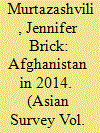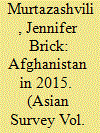| Srl | Item |
| 1 |
ID:
137898


|
|
|
|
|
| Summary/Abstract |
Labeled the Year of ‘‘Transition,’’ 2014 was a watershed in modern Afghan history. It marked the first peaceful transition of power in more than a century, when Hamid Karzai handed over authority to Ashraf Ghani on September 29. The transition was not seamless, and the country teetered on the brink of a coup following the June presidential runoff.
|
|
|
|
|
|
|
|
|
|
|
|
|
|
|
|
| 2 |
ID:
145451


|
|
|
|
|
| Summary/Abstract |
Hopes for national unity and stability in Afghanistan were dashed in 2015 as the government lost control of significant territory to insurgents. Kunduz City fell briefly to the Taliban, the first major city to fall to them since 2001. The ANSF experienced heavy casualties, at a time when nearly one-fifth of the country’s districts were either controlled or heavily contested by the Taliban.
|
|
|
|
|
|
|
|
|
|
|
|
|
|
|
|
| 3 |
ID:
185648


|
|
|
|
|
| Summary/Abstract |
The two-decade effort by the United States and its NATO allies to build a modern liberal state in Afghanistan envisioned electoral democracy replacing village councils and other forms of customary authority. But citizens still rely on these community-based bodies to resolve disputes, provide small-scale public goods and services, and broker relations with local government. Customary institutions may also provide protection against predatory government officials. Although the international community has largely overlooked customary authority, US and NATO military forces eventually recognized their importance. Throughout history, Afghan rulers have regarded customary authorities as threats to their power, and they have been largely excluded from ongoing peace talks among the United States, the Afghan government, and the Taliban.
|
|
|
|
|
|
|
|
|
|
|
|
|
|
|
|